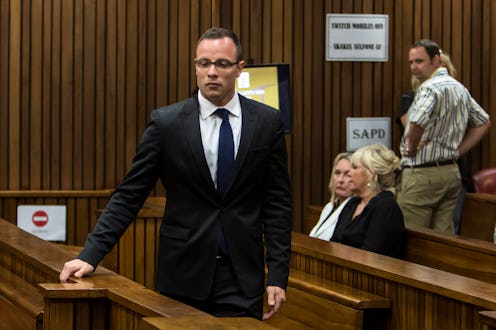News
Pistorius' Fate Rests In The Hands Of One Woman
The world is following every move of the Oscar Pistorius murder trial. Every sob, howl, and retch that comes from the Blade Runner is documented, reported, tweeted. Every razor-sharp question from "pit bull" prosecutor Gerrie Nel, every word and gesture from every witness who takes the stand is analyzed and interpreted — but the person with whom Pistorius's fate actually rests is barely mentioned at all. Judge Thokozile Masipa — softly-spoken, perfectly poised, unflinchingly attentive — is the one who will eventually make the decision as to whether Pistorius ought to live out the rest of his days behind bars.
She'll decide whether Pistorius did indeed mistake his girlfriend Reeva Steenkamp for an intruder and shoot her out of self-defense. She will decide whether it was a premeditated, cold-blooded murder, a crime passionnel or just a tragic, horrific accident.
Trials in South Africa have been decided by judge alone — minus the jury we're used to seeing — for more than 40 years. Jury trials were abolished back in 1969 while the country was still under apartheid. The fear was that a jury — on which the law dictated only whites may serve — was wide open to racial prejudice, which would inhibit a fair trial.
In fact, the use of jury trials was gradually decreasing in South Africa throughout the whole of the twentieth century. The country's 1917 Criminal Procedure and Evidence Act 31 allowed those on trial in certain circumstances to request to be tried without a jury. By 1954, an amendment to the criminal code meant that those wishing for a jury trial had to specifically request one.
When Judge Masipa was called to sit on the Transvaal High Court in 1998 she was only the second black woman to ever have done so. She spent a significant portion of her life living under apartheid. She did not pass her bar exams until she was 43 years old, and before that she worked as a crime reporter.
And she's as tough as they come, especially when it comes to violent crimes against women. Masipa once sentenced a man named Shepherd Moyo to a 252-year sentence for raping three women during a series of house robberies, saying she was most shocked and troubled by the way these women were violated in their own homes. She also handed down a life sentence to a policeman who shot and killed his former wife during an argument.
Masipa does have a little bit of help determining the final decision in Pistorius's trial. The justice system in South Africa requires assessors to be appointed by the judge — legal experts, who are often solicitors — to assist in hearing the trial. Masipa has appointed two, who can be seen sitting either side of her in the courtroom. When it comes to a verdict on the facts of the case, if the two assessors take one side and Masipa the other, then South African law allows her to be be overruled.
When it comes to actually making decisions about the law and, if it comes to it, sentencing, then the judge makes those decisions alone.
It's clear Pistorius is aware of just how much power Masipa has, as he mumbles "my lady" at the end of virtually every sentence. But so far Masipa has appeared unaffected by Pistorius's tearful apologies and emotional outbursts, although on several occasions she has reined-in Gerrie Nel.
Pistorius's trial recommences on Monday, May 5.
